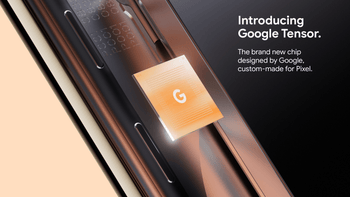Google, inspired by Apple, is developing custom chipsets for tablets and Chromebooks

The Pixel 6 and Pixel 6 Pro are set to be released in late October with Google’s first custom smartphone chipset — Tensor. Now, a new report claims that Tensor for smartphones is only the beginning of Google’s chipset ambitions.
Nikkei Asia reports that Google is currently developing custom processors for a range of upcoming products including Chromebooks and tablets that run on its popular Chrome OS software rather than Android or Fuchsia.
The unnamed products should hit shelves sometime in 2023, according to three people familiar with the situation. Nikkei claims the move is the latest sign that tech giants view in-house chipset development as key to their success.
As for what pushed Google down the custom chipset path, two sources claim that Apple’s in-house iPhone chipsets and, more recently, its Arm-based Mac processors have been a big inspiration for Google.
Whether this move is enough to boost Google’s Chromebook and Chrome OS-based tablet shipments is another matter.
As noted by Nikkei, data from IDC suggests that Google’s Pixelbook Chromebook and Pixel Slate tablet each shipped under 500,000 units in their respective launch years. Demand for Chromebooks is currently higher than ever, though.
In the meantime, we’ll have to look to the upcoming Pixel 6 series for signs of success. If Google can successfully market its tech and the flagships perform well, there’s no reason to believe it wouldn’t be able to replicate that success in the Chromebook and tablet segments.
Future Chromebooks and tablets may also use Tensor chips
Nikkei Asia reports that Google is currently developing custom processors for a range of upcoming products including Chromebooks and tablets that run on its popular Chrome OS software rather than Android or Fuchsia.
As for what pushed Google down the custom chipset path, two sources claim that Apple’s in-house iPhone chipsets and, more recently, its Arm-based Mac processors have been a big inspiration for Google.
Like Apple, Google is developing its in-house silicon on the Arm architecture. The latter forms the basis of all modern smartphone and smartwatch processors, so Google most certainly has a history of working with the tech.
Will in-house chipsets make a success of Google's hardware plans?
Whether this move is enough to boost Google’s Chromebook and Chrome OS-based tablet shipments is another matter.
As noted by Nikkei, data from IDC suggests that Google’s Pixelbook Chromebook and Pixel Slate tablet each shipped under 500,000 units in their respective launch years. Demand for Chromebooks is currently higher than ever, though.
In the meantime, we’ll have to look to the upcoming Pixel 6 series for signs of success. If Google can successfully market its tech and the flagships perform well, there’s no reason to believe it wouldn’t be able to replicate that success in the Chromebook and tablet segments.









Things that are NOT allowed: